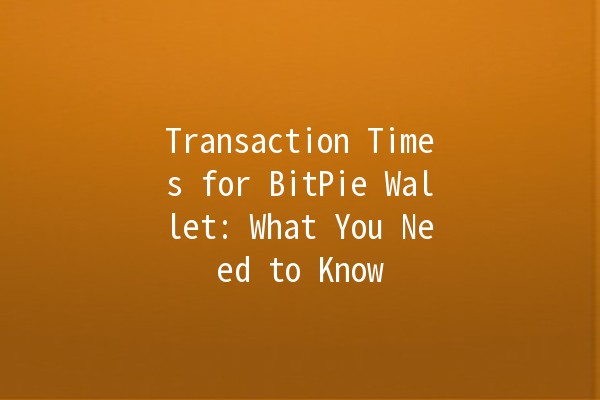
BitPie Wallet has gained popularity among cryptocurrency enthusiasts for its userfriendly interface and robust security features. However, one common concern for users is how long transactions take when using this wallet. Understanding transaction times is crucial for managing your assets effectively, especially when dealing with cryptocurrencies. This article delves into transaction times for the BitPie Wallet, explores factors affecting these times, and offers practical tips for enhancing productivity when transferring funds.
Understanding BitPie Wallet Transactions

BitPie Wallet functions as a multicurrency wallet that supports a variety of digital currencies. Transactions involve sending and receiving cryptocurrency, which typically requires confirmation from the network. This can vary based on several factors, including network congestion and the type of cryptocurrency being traded.
Factors Affecting Transaction Time
Cryptocurrencies operate on decentralized networks, and transaction times can be significantly affected by the number of users attempting to make transfers at any given time. When demand is high, transactions may take longer to process.
Example: During a Bitcoin market surge, many users may try to send Bitcoin, leading to a backlog and extended waiting times.
Higher fees often ensure faster processing times. Network miners prioritize transactions with higher fees, which can result in quicker confirmations.
Example: If a user sets a low fee for a Bitcoin transaction during a busy period, their transaction may remain unconfirmed longer than one associated with a higher fee.
Different cryptocurrencies have varying protocols and confirmation times. For instance, Ethereum typically has faster transaction times than Bitcoin due to its different blockchain dynamics.
Example: An Ethereum transaction might be confirmed in a matter of minutes, while a Bitcoin transaction could take longer during peak hours.
The configuration and settings of the wallet can also impact transaction times. Users should ensure their wallets are updated for optimal performance.
Example: Users who regularly transact may want to adjust their transaction fee settings to automatically choose optimal fees based on current network conditions.
Some transactions, like those involving tokens or interacting with smart contracts, may take longer due to the additional processing required.
Example: Sending a token on the Ethereum network may require more confirmations compared to merely sending Ether.
Average Transaction Times for Popular Cryptocurrencies
Bitcoin (BTC): 10 minutes to several hours, depending on network traffic and fees.
Ethereum (ETH): Typically around 15 seconds to a couple of minutes.
Litecoin (LTC): Approximately 2.5 minutes.
Ripple (XRP): Generally 4 seconds or less.
Tips to Enhance Productivity When Transferring with BitPie Wallet
To ensure a smooth transaction experience, consider implementing the following five productivity enhancement tips:
Explanation: Many wallets, including BitPie, allow users to set transaction fees automatically or manually. Adjusting default fees can lead to faster processing times during busy periods.
Application Example: Access your BitPie settings to change the default fee to high during expected spikes in transactions. This ensures quicker confirmations when transferring assets.
Explanation: Being aware of current network conditions can help time your transactions for maximum efficiency. Various websites track blockchain performance and congestion.
Application Example: Before sending a Bitcoin transaction, check Bitcoin's blockchain status on a site like Blockchain.info for congestion levels. This knowledge can help you choose the best time to send.
Explanation: Different cryptocurrencies have different transaction speeds. If speed is a priority, consider transferring assets in quicker networks.
Application Example: Instead of moving assets using Bitcoin, consider converting some assets into Ethereum for faster processing if you need to make a quick transfer.
Explanation: Enable transaction notifications within the BitPie Wallet to stay updated on the status of your transactions.
Application Example: Configure your wallet to alert you when transactions are confirmed, allowing for better tracking of your assets without constant manual checking.
Explanation: Keeping uptodate with cryptocurrency news can help predict potential slowdowns or congestion times based on market behavior.
Application Example: Follow cryptocurrency news platforms or engage with community forums like Reddit or Telegram groups dedicated to cryptocurrency discussions.
Common Concerns and Questions
Transactions may take longer due to high network congestion. If users set low transaction fees, miners may prioritize other transactions, leading to delays.
Generally, cryptocurrency transactions cannot be canceled once sent. However, if the transaction remains unconfirmed, you may be able to replace it with a higher transaction fee via certain wallets.
Users can set transaction fees manually or automatically in the wallet. Higher fees encourage faster processing by miners.
If a transaction fails, the coins should return to your wallet. Always check the transaction status on the blockchain explorer.
Limits depend on both the BitPie Wallet settings and the specific cryptocurrency's network rules. Always check the wallet's FAQs for specific limits.
You can lower fees by sending funds during less congested times. Alternatively, use cryptocurrencies with lower transaction costs, such as Litecoin or Ripple.
Closing Thoughts
Understanding the nuances of transaction times in BitPie Wallet can significantly enhance your cryptocurrency experience. By applying the tips outlined, you can streamline your process, minimize waiting time, and make more informed choices. With the dynamic nature of the cryptocurrency market, staying proactive and educated is key to effective asset management. Keep the aforementioned strategies in mind, and enjoy a seamless transaction experience with your BitPie Wallet!

